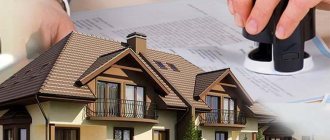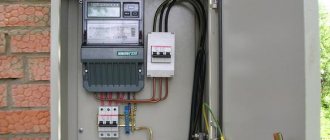The HOA is obliged to send an offer agreement to the owner - not a member
A homeowners' association is created on the condition that owners who have more than 50% of the votes of the total number of votes in the house are ready to join it (Part 3 of Article 135 of the Housing Code of the Russian Federation). Consequently, not all owners of premises may be members of the partnership, and this group of apartment building residents is not subject to the Charter of the partnership. Therefore, according to paragraphs. “b” clause 16 of RF PP No. 491, proper maintenance of common property is ensured by the homeowners’ association by:
- membership of premises owners in the HOA;
- concluding agreements with property owners who are not members on the maintenance and repair of common property.
An indication of the need for the HOA to enter into agreements with non-members who own premises in the apartment building is also indicated in Part 6 of Art. 155 Housing Code of the Russian Federation, paragraphs. “d” clause 4 of the RF PP No. 416. The form of such an agreement is not fixed in the regulatory legal acts, however, in its essential terms it is necessary to include a list of works and services and their cost approved by the general meeting (part 1 of article 137, part 2 of article 145 Housing Code of the Russian Federation). The agreement between the HOA and the owner who is not included in it must be concluded in writing according to the following algorithm:
- The partnership sends a draft document to each owner of the premises who has not joined the HOA.
- The resident of the house has 30 days from the date of receipt to sign the agreement, or draw up a protocol of disagreements to it, if he is not satisfied with some points in the document.
There is a third option: the owner of the premises refuses to sign the contract (Part 1 of Article 445 of the Civil Code of the Russian Federation). Let's talk further about this situation in more detail.
On the peculiarities of holding general meetings of members of HOAs and residential complexes
418019
Management agreement for an apartment building with a management organization
An apartment building can be managed by only one management organization (Part 9 of Article 161 of the Housing Code of the Russian Federation). The management agreement for an apartment building is concluded in writing by drawing up one document signed by the parties. When choosing a management organization by a general meeting of owners of premises in an apartment building, a management agreement is concluded with each owner of premises in such a building on the terms specified in the decision of this general meeting. In this case, the owners of premises in this building, having more than fifty percent of the votes of the total number of votes of the owners of premises in this building, act as one party to the concluded agreement.
Under an agreement for the management of an apartment building, one party (the management organization) on the instructions of the other party (the owners of the premises in the apartment building, the management bodies of the homeowners' association, housing cooperative, other specialized consumer cooperative or, in the case provided for by law, the developer) for an agreed period of time for a fee undertakes to provide services and carry out work for the proper maintenance and repair of common property in such a building, to provide utilities to the owners of premises in such a building and to persons using the premises in this building, and to carry out other activities aimed at achieving the goals of managing an apartment building.
The management agreement for an apartment building, concluded in the manner established by the Housing Code of the Russian Federation, must be placed by the management organization in the system in the manner established by the federal executive body exercising the functions of developing and implementing state policy and legal regulation in the field of information technology, together with the federal an executive body that carries out the functions of developing and implementing state policy and legal regulation in the field of housing and communal services.
The law defines the content of the contract; it must indicate:
1) the composition of the common property of the apartment building in respect of which management will be carried out, and the address of such a building; It is not possible to make a description of the common property; the owners do not have such documentation, and the contracts would be very cumbersome. A floor plan of the house is enough.
2) a list of services and works for the maintenance and repair of common property in an apartment building, the procedure for changing such a list, as well as a list of utilities provided by the management organization;
3) the procedure for determining the contract price, the amount of payment for the maintenance and repair of residential premises and the amount of payment for utilities, as well as the procedure for making such payment;
4) the procedure for monitoring the management organization’s fulfillment of its obligations under the management agreement.
The terms of the management agreement for an apartment building are established the same for all owners of premises in the apartment building. The use of this rule is problematic due to the presence of non-residential premises owners in the house and different levels of services.
The management agreement for an apartment building, with the exception of the agreement concluded by the developer, is concluded for a period of no less than one year and no more than five years, and a mandatory agreement for a period of no less than one year and no more than three years.
In the absence of an application from one of the parties to terminate the management agreement for an apartment building at the end of its validity period, such an agreement is considered extended for the same period and on the same conditions as provided for in such an agreement.
Unless otherwise established by the management agreement for an apartment building, the management organization is obliged to begin implementing such an agreement no later than thirty days from the date of its signing.
Changes and (or) termination of the management agreement for an apartment building are carried out in the manner prescribed by civil law. For a mandatory agreement concluded as a result of a competition, the Housing Code of the Russian Federation establishes special rules for the unilateral refusal of its execution by the owners on the basis of a decision of the general meeting:
1) after each subsequent year, if they have chosen the method of managing an apartment building
2) if the management organization does not comply with the terms of the contract
The management organization, thirty days before the termination of the management agreement for an apartment building, is obliged to transfer the technical documentation for the apartment building and other documents related to the management of such a house to the newly selected management organization, a homeowners' association or a housing cooperative or other specialized consumer cooperative, or in the case of direct management of such a house by the owners premises in such a house to one of these owners, indicated in the decision of the general meeting of these owners on the choice of the method of managing such a house, or, if such an owner is not indicated, to any owner of premises in such a house.
Unless otherwise established by the management agreement for an apartment building, the management organization annually, during the first quarter of the current year, submits to the owners of premises in the apartment building a report on the implementation of the management agreement for the previous year.
As a third method, the possibility of creating an HOA is indicated - this is a non-profit organization, the creation and activities of which are regulated by Section 6 of the Housing Code of the Russian Federation. History of the Federal Law dated May 24, 1996 “On Homeowners’ Associations.” There is a fairly developed institute abroad: USA, Germany. Advantages: accumulation of funds in the account, control by the owners, fast service due to the dispatch service. In Russia, the number of HOAs has increased significantly over the past three years. Difficulties: defaulters, choice of repair organizations, they are mostly municipal, i.e. no competition.
A homeowners' association is a non-profit organization, an association of owners of premises in an apartment building for joint management of common property in an apartment building or the property of owners of premises in several apartment buildings or the property of owners of several residential buildings, ensuring ownership, use and, within the limits established by law, disposal of common property in an apartment building house or joint use of property owned by the owners of premises in several apartment buildings, or property owned by the owners of several residential buildings, carrying out activities to create, maintain, preserve and increase such property, providing utilities to persons using the premises in accordance with this Code in these apartment buildings or these residential buildings, as well as for carrying out other activities aimed at achieving the goals of managing apartment buildings or for the joint use of property belonging to the owners of premises in several apartment buildings, or the property of the owners of several residential buildings.
The concept of a homeowners' partnership has been significantly expanded. Firstly, the legislator tried to include in it all possible options (models) for creating the specified legal entity. This is not only an association of owners of one apartment building, as mentioned earlier, but also of several apartment buildings or several residential buildings. Taking into account, however, the fact that, according to Part 2 of Art. 136 of the Housing Code of the Russian Federation, a partnership can also be created by the owners of country houses; the definition from these positions still cannot be regarded as universal. Secondly, the functions of this non-profit organization have been somewhat modified and expanded. Nowadays we are not talking about managing a complex of real estate, but managing the common property of an apartment building, which is more consistent with the entire terminology of the Housing Code of the Russian Federation. In addition, on the one hand, the need to ensure the operation of common property has been removed from the purposes of creating an organization, probably for the reasons that it is an integral part of the concept of “common property management”; on the other hand, another function has been added to create, maintain, preservation and growth of such property, provision of public services. In the list of actions denoting the last function, in our opinion, there is clearly that part that is already covered by the concept of “management”, and, therefore, there is no need to specifically consolidate it in the definition. This conclusion is confirmed by the indication that completes the definition about any other possible activity aimed at achieving management goals. Then the question arises: why repeat ourselves, superimposing similar concepts on top of each other? If there is a need, within the framework of the definition of a partnership, to disclose or detail management activities in detail, then the structure of the definition itself should, from our point of view, be different. The function associated with ensuring ownership, use and, within the limits established by law, disposal of common property has been retained in its previous form only in relation to a partnership organized in one apartment building. For other models, it only sounds like “sharing of property.” This differentiated approach is not entirely logical. That is, with regard to other forms of partnership, we can no longer talk about the disposal of common property, which is not entirely explainable. It is logical to either completely exclude this possibility, so as not to compete with the activities (competence) of the general meeting of owners of the premises of an apartment building, or to preserve it for all types of partnerships, regardless of the specifics of their creation. Otherwise, an HOA created by merging several apartment buildings, which also have property that is in common shared ownership, is a truncated version of the organization in terms of the tasks assigned to it; it will not be able to fully carry out the activities intended by the legislator for such legal entities, therefore the association owners of several small houses to create one organization will no longer be so effective.
As noted by the Resolution of the Constitutional Court of the Russian Federation of April 3, 1998, HOAs as one of the possible methods of management and membership in it is derivative in relation to the right of ownership, the emergence of ownership rights cannot be made dependent on membership in the HOA.
Membership in the HOA arises from the owner of the premises in an apartment building on the basis of an application for membership in the HOA (Article 143 of the Housing Code of the Russian Federation). (unlike residential complexes, housing cooperatives, the procedure for its consideration and payment of entrance fees has not been established, since we are talking about the owner) Membership in the homeowners’ association is terminated from the moment of filing an application to leave the partnership members or from the moment of termination of the partnership member’s ownership of the premises in an apartment building.
The register of members of a homeowners' association must contain information allowing identification of members of the association and communication with them, as well as information on the size of their shares in the right of common ownership of common property in an apartment building.
The number of members of the homeowners' association who created the partnership must exceed fifty percent of the votes of the total number of votes of the owners of premises in an apartment building.
As any legal entity is subject to state registration, the constituent document is the Charter. When state registration of a homeowners' association, the minutes of the general meeting of owners of premises in an apartment building are submitted, at which decisions were made on the creation of the partnership and on the approval of its charter, and the charter of the partnership, as well as information about the persons who voted at the general meeting of owners of premises in an apartment building for the creation homeowners' associations, about the shares belonging to these persons in the right of common ownership of common property in an apartment building.
It is no coincidence that innovations have appeared in the Housing Code of the Russian Federation regarding the procedure for registering a homeowners' association. A number of researchers correctly note that a homeowners’ association differs significantly from other categories of legal entities in terms of goals, objectives and procedure for creation. A simplified registration procedure for such a legal entity may create preconditions for violating the rights of the owners of residential premises in an apartment building.
The charter of the homeowners' association is adopted at a general meeting, which is held in the manner established by Articles 45 - 48 of the Housing Code of the Russian Federation, by a majority vote of the total number of votes of the owners of premises in an apartment building. The charter of the homeowners' association may provide for the use of a system or other information system when resolving issues related to the management of the homeowners' association, taking into account the functions of these systems.
The minutes of the general meeting of owners of premises in an apartment building, at which decisions were made on the creation of a homeowners' association and the approval of its charter, are signed by all owners of premises in an apartment building who voted for the adoption of such decisions.
A homeowners' association is created without a limitation on the period of activity, unless otherwise provided by the charter of the association.
Due to the fact that we are talking about a voluntary association, not all owners can be members of the HOA; in this case, the HOA enters into an agreement with the rest of the HOA on the maintenance and repair of the house, since they bear the burden of maintaining the property.
Owners of premises in an apartment building can create only one HOA. (the reason for this is the unity of objects of common property, although previously a different situation was allowed) The decision on creation is made at a general meeting.
A homeowners' association can be created:
The effect of paragraph 1 of part 2 of Article 136 (as amended on June 4, 2011) does not apply to homeowners’ associations created before the entry into force of Federal Law dated June 4, 2011 N 123-FZ (
1) owners of premises in several apartment buildings, if these houses are located on land plots that, in accordance with the documents contained in the state real estate cadastre, have a common border and within which there are engineering support networks and other infrastructure elements that are intended for joint use owners of premises in these houses. Decisions on the creation of a partnership, on approval of its charter, election of the board of the partnership, on vesting a citizen (including the owner of premises in one of these houses) with the authority of the applicant to apply to the authorities carrying out state registration of legal entities, and in cases provided for by the charter of the partnership, Also, the election of the chairman of the board of the partnership is adopted at general meetings of the owners of premises in each apartment building by a majority of at least two-thirds of the votes of the total number of votes of the owners of premises in the given building. The specifics of the adoption and execution of these decisions are established by the federal executive body that carries out the functions of developing state policy and legal regulation in the field of construction, architecture, urban planning (with the exception of state technical accounting and technical inventory of capital construction projects) and housing and communal services;
2) owners of several nearby residential buildings, country houses with or without personal plots, garages and other objects, if these houses are located on land plots that have a common border and within which there are utility networks and other infrastructure elements, which are designed to serve more than one residential building. Decisions on the creation of a partnership and the approval of its charter are made by agreement of all owners of these houses. Decisions on the election of the board of the partnership, on granting a citizen (including one of the owners of residential buildings) the authority of the applicant to apply to the bodies carrying out state registration of legal entities, and in cases provided for by the charter of the partnership, also on the election of the chairman of the board of the partnership are made at a general meeting owners of residential buildings by a majority of at least two-thirds of the total number of votes of owners of residential buildings.
The possibility of creating a partnership between the owners of premises in several apartment buildings is significantly limited. The efficiency of partnerships designed for a large number of houses and apartments is low, given that we are talking about non-professional participants in emerging relationships, so the removal of this opportunity from our position will not negatively affect the rights of owners. Other previously used and in need of clarification conditions for organizing this type of partnership have been clarified: the concept of “common (adjacent)” land plots has been deciphered - these are plots that, in accordance with the documents contained in the state real estate cadastre, have a common border; an additional feature is indicated for infrastructure elements located within the boundaries of these areas - “intended for joint use by the owners of the premises in these houses.”
As before, it is allowed to create a homeowners’ association not only to manage the common property of an apartment building, but also when merging several closely located residential and country houses in order to resolve common issues. Since they have certain specifics, such organizations have their own procedure for creating (by agreement of all owners) and electing bodies. Indeed, in the absence of common shared ownership, the principle of “majority votes” cannot be applied when creating a partnership and approving its charter.
To represent and protect common interests in the management of apartment buildings, two or more homeowners' associations, by agreement among themselves, can create an association (union) of homeowners' associations.
The governing bodies of the HOA are:
General meeting of members and board (Article 144 of the Housing Code of the Russian Federation). Why is the chairman not named???, although it is indicated that he, without a power of attorney, exercises the legal personality of a legal entity. All bodies are formed from among the members of the HOA (Article 149 of the Housing Code of the Russian Federation)
The control body is the audit commission (auditor). Is it possible to involve non-members of the HOA? – there is no direct instruction from the Housing Code of the Russian Federation.
The general meeting of members of the homeowners association is the highest governing body of the association and is convened in the manner established by the charter of the association.
The competence of the general meeting of members of the homeowners association includes:
1) introducing amendments to the charter of the partnership or approving the charter of the partnership in a new edition;
2) making decisions on the reorganization and liquidation of the partnership, appointing a liquidation commission, approving interim and final liquidation balance sheets;
3) election of members of the board of the partnership, members of the audit commission (auditor) of the partnership and, in cases provided for by the charter of the partnership, also the chairman of the board of the partnership from among the members of the board of the partnership, early termination of their powers;
4) establishing the amount of obligatory payments and contributions of members of the partnership;
5) approval of the procedure for the formation of the partnership’s reserve fund, other special funds of the partnership (including funds for current and major repairs of common property in an apartment building) and their use, as well as approval of reports on the use of such funds;
6) making a decision on obtaining borrowed funds, including bank loans;
7) determining the directions for using income from the economic activities of the partnership;
 approval of an annual plan for the maintenance and repair of common property in an apartment building, a report on the implementation of such a plan;
approval of an annual plan for the maintenance and repair of common property in an apartment building, a report on the implementation of such a plan;
8.1) approval of estimates of income and expenses of the partnership for the year, reports on the implementation of such estimates, audit reports (in the case of audits);
8.2) approval of the annual report on the activities of the management board of the partnership;
8.3) approval of the conclusion of the audit commission (auditor) of the partnership based on the results of the audit of the annual accounting (financial) statements of the partnership;
9) consideration of complaints against the actions of the board of the partnership, the chairman of the board of the partnership and the audit commission (auditor) of the partnership;
10) adoption and amendment, upon the proposal of the chairman of the board of the partnership, of the internal regulations of the partnership in relation to employees whose responsibilities include the maintenance and repair of common property in an apartment building, provisions on the payment of their labor, approval of other internal documents of the partnership provided for by this Code, the charter of the partnership and decisions of the general meeting of members of the partnership;
11) determining the amount of remuneration for members of the board of the partnership, including the chairman of the board of the partnership;
— other issues provided for by this Code or other federal laws. The charter of the homeowners association may also include the resolution of other issues in addition to those specified in Part 2 of this article within the competence of the general meeting of members of the association.
Article 146. Procedure for organizing and holding a general meeting of members of the homeowners association
Notification of a general meeting of members of a homeowners' association is sent in writing by the person on whose initiative the general meeting is convened, and is given to each member of the partnership against signature or by mail (registered mail) or in another way provided for by the decision of the general meeting of members of the partnership or the charter of the partnership . The notice is sent no later than ten days before the date of the general meeting.
The powers of the general meeting of members of the homeowners association are established in accordance with Article 45 of this Code and the charter of the partnership. The general meeting of members of a homeowners' association is valid if it is attended by members of the association or their representatives who have more than fifty percent of the votes of the total number of votes of the members of the association.
Decisions of the general meeting of members of the homeowners' association on issues referred by this Code to the competence of the general meeting in accordance with paragraphs 2, 6 and 7 of part 2 of Article 145 of this Code are adopted by at least two-thirds of the votes of the total number of votes of the members of the association. Decisions on other issues are made by a majority vote of the total number of votes of the members of the partnership or their representatives present at the general meeting.
The general meeting of members of the homeowners association is chaired by the chairman of the board of the association or his deputy. In case of their absence, the general meeting is chaired by one of the members of the board of the partnership.
Board of the homeowners association (Article 147 of the Housing Code of the Russian Federation)
The board of a homeowners association is the executive body of the partnership, accountable to the general meeting of members of the partnership; it manages the activities of the homeowners association and is carried out by the board of the partnership. The board of a homeowners' association has the right to make decisions on all issues of the partnership's activities, with the exception of issues falling within the exclusive competence of the general meeting of owners of premises in an apartment building and the competence of the general meeting of members of the homeowners' association. The board of a homeowners' association is elected from among the members of the association by the general meeting of members of the association for the period established by the charter of the association, but not more than for two years. The board of a homeowners' association elects from among its members the chairman of the partnership, if the election of the chairman of the partnership is not within the competence of the general meeting of members of the partnership by the charter of the partnership.
A member of the board of a homeowners' association cannot be a person with whom the association has entered into an agreement for the management of an apartment building, or a person holding a position in the management bodies of the organization with which the association has entered into the said agreement, as well as a member of the audit commission (auditor) of the association. A member of the board of a homeowners' association cannot combine his activities on the board of the partnership with work in the partnership under an employment contract, as well as entrust, trust, or otherwise entrust to another person the performance of his duties as a member of the board of the partnership.
A meeting of the board of a homeowners association is convened by the chairman within the time limits established by the charter of the association. The board of a homeowners association is competent to make decisions if at least fifty percent of the total number of members of the board of the association are present at a meeting of the board of the association. Decisions of the board of the partnership are made by a simple majority of votes from the total number of votes of the board members present at the meeting, unless a larger number of votes for making such decisions is provided for by the charter of the partnership. Decisions made by the board of the partnership are documented in the minutes of the meeting of the board of the partnership and signed by the chairman of the board of the partnership, the secretary of the meeting of the board of the partnership.
The responsibilities of the board of homeowners associations are specifically established:
1) compliance by the partnership with the legislation and the requirements of the charter of the partnership;
2) control over the timely payment by members of the partnership of established mandatory payments and contributions;
3) drawing up estimates of income and expenses for the corresponding year of the partnership and reports on financial activities, submitting them to the general meeting of members of the partnership for approval;
4) management of an apartment building or concluding contracts for its management;
5) hiring workers to service an apartment building and dismissing them;
6) concluding contracts for the maintenance, operation and repair of common property in an apartment building;
7) maintaining a register of members of the partnership, office work, accounting and financial reporting;
 convening and holding a general meeting of members of the partnership;
convening and holding a general meeting of members of the partnership;
9) fulfillment of other duties arising from the charter of the homeowners association.
The chairman of the board of a homeowners' association acts without a power of attorney on behalf of the partnership, signs payment documents and makes transactions that, in accordance with the law, the charter of the partnership, do not require mandatory approval by the board of the partnership or the general meeting of members of the partnership, develops and submits for approval to the general meeting of members of the partnership internal rules regulations of the partnership in relation to employees whose responsibilities include the maintenance and repair of common property in an apartment building, regulations on remuneration for their labor, approval of other internal documents of the partnership
Audit commission (auditor) of a homeowners association (Article 150 of the Housing Code of the Russian Federation)
The audit commission (auditor) of a homeowners' association is elected by the general meeting of members of the association for no more than two years. The audit commission of a homeowners' association cannot include members of the association's board.
The audit commission of the homeowners association elects the chairman of the audit commission from among its members.
Audit commission (auditor) of the homeowners association:
1) conducts audits of the financial activities of the partnership at least once a year;
1.1) presents to the general meeting of members of the partnership a conclusion based on the results of the audit of the annual accounting (financial) statements of the partnership;
2) presents to the general meeting of members of the partnership a conclusion on the estimate of income and expenses for the corresponding year of the partnership and a report on financial activities and the amount of mandatory payments and contributions;
3) reports to the general meeting of members of the partnership on its activities.
In relation to the procedure for holding a supreme governing body, firstly, it is possible to use other methods of notifying about it in addition to registered letters and delivery against signature, which, in our opinion, will make it easier to convene it, since it may be less time-consuming and expensive. Secondly, the competence of the meeting is determined differently; now it does not depend on the number of members, but is determined by the number of their votes, by analogy with the competence of the general meeting of owners of the premises of an apartment building. A unified approach in both cases seems logical to us, given the close relationship between them, but, unfortunately, does not contribute to the full realization of their rights by all members of the organization. The Housing Code of the Russian Federation does not directly determine the number of votes a member of an HOA has. Probably, the number of votes is determined similarly to the rules provided for the general meeting of premises owners, in proportion to the share in the right of common ownership of common property in an apartment building, since the entire procedure for holding the meeting as a whole contains a general reference to Art. Art. 45-48 LC RF (Clause 1.1, Article 146 LC RF). This fact is confirmed by a new approach to determining the competence of a meeting. As in the case of voting at a general meeting of owners of building premises, the possibility of conducting absentee voting is limited, since the norm regulating its conduct contains a reference to Art. Art. 47 and 48 of the Housing Code of the Russian Federation, which establishes the corresponding regulation. The previously envisaged forms of holding a meeting through a written survey or voting by groups of members of the partnership, depending on the type of premises, have been excluded by the legislator.
In Article 137 of the RF Housing Code, two groups of partnership rights can be distinguished.
The first is directly related to the HOA’s performance of the functions assigned to it:
Payment of utility bills by a non-member - confirmation of existing contractual relations
Relations between the HOA and all owners of premises in the house are binding, regardless of whether such residents of the apartment building are members of the partnership and whether they participated in the OSS on the issue of its creation. Non-members of the HOA cannot refuse the services that the partnership provides to all owners: services and maintenance work are aimed at all common property as a whole. The owner’s share in it can only be calculated, but not allocated in kind, so that this particular share is not serviced by the HOA due to the owner’s refusal to pay for it (Part 4 of Article 37 of the Housing Code of the Russian Federation).
However, no one can force a resident of the house to sign an agreement with the HOA, although the partnership is required by law to conclude it with a non-member (Clause 2, Part 1, Article 138 of the Housing Code of the Russian Federation). Therefore, if the association sent an offer to the owner, but he did not respond to it in any way, it is considered that the HOA has fulfilled the obligations assigned to it by law. The main thing is that the partnership has confirmation of the fact that the documents were sent.
But in such a situation, the written contract essentially remains unconcluded. However, we can say that payment by the owners of bills for housing and communal services, which the HOA sends to them monthly, is regarded as consent to the terms of the agreement (Part 3 of Article 434, Part 3 of Article 438 of the Civil Code of the Russian Federation). The invoice reflects the essential terms of the offer: a list of works and services and their cost, approved at the general meeting.
This corresponds to the position of the Plenum of the Armed Forces of the Russian Federation, expressed in Resolution No. 49 dated December 25, 2018 and the norms of Part 1 of Art. 8 Civil Code of the Russian Federation. Consequently, the relationship between the partnership and the owner of the premises - not a member in such a situation is considered established.
How to draw up documents for the general meeting of members of HOAs and residential complexes
164120
Maintenance of common property: what does it include?
According to Article 151 of the Housing Code of the Russian Federation, the property of the partnership itself is movable and immovable property located inside and outside the house:
- premises for servicing the activities of the HOA;
- inventory;
- office equipment;
- furniture;
- consumables, the use of which is mandatory for the performance of the tasks provided for in the charter.
The HOA has the right to acquire property at the expense of membership fees if such acquisition is carried out to achieve the statutory goals of the organization.
Note! The partnership does not have the ability to alienate, and, therefore, acquire shared property. However, by decision of the general meeting, such property may be transferred to the partnership for use.
Any acquisition of new movable property by the HOA is recorded in accounting entries and has documentary support and confirmation (check, agreement, etc.). Ownership of real estate is registered in the relevant title documents, where the owner is designated as a partnership.
The HOA may acquire at its disposal the property that belonged to the owners, but for use for purposes other than residence. For example, these could be various non-residential premises on the ground floor, which were used for arranging shops, pharmacies, studios, etc.
The maintenance and acquisition of property of the partnership is carried out at the expense of membership fees of home owners. With these funds, the HOA has the right to purchase anything that is directly related to achieving the goals specified in the charter. These funds also pay salaries to the administration and service personnel.
Board room
The premises in which the board and maintenance personnel carry out their work may be allocated from part of the shared ownership. This decision is made by all owners. An area in the corridor, basement, on the technical floor can be allocated, or a separate room in the house can be purchased at the expense of members of the HOA.
The premises must have access to electrical and heating networks, means for storing documentation (contracts, accounting reports), and, provided there is a cash register for accepting contributions and payments, a security system.
Remember
The homeowners' association, managing an apartment building, provides housing and communal services:
- members of the HOA by virtue of the provisions of the Charter and decisions of general meetings of members of the partnership;
- non-members - on the basis of a concluded agreement for the provision of services.
The HOA must send an offer to each owner of the premises in the building who is not part of the association. At the same time, failure to sign the agreement by the owner does not relieve him of the obligation to bear the costs of maintaining the common property in the apartment building.
If the owner pays the bills that the HOA sends him monthly for housing and communal services, then the contractual relationship is considered established. If the assessments are not paid, the HOA has the right to go to court demanding that the owner pay off the debt, and the absence of a concluded agreement cannot serve as an argument in favor of the debtor.
Homeowners' property
According to Article 36 of the Housing Code of the Russian Federation, common property is considered to be that which is used to service two or more premises.
The common property of apartment building residents includes:
- elevators, corridors, staircases, basements and attics;
- premises allocated to meet social and domestic needs;
- engineering and technical equipment located both inside and outside the premises;
- roofs and technical fences;
- local area.
Reference! Over time, through the use of targeted contributions from citizens and non-members of the partnership, new objects of shared public property can be created in the apartment building, for example, a sports or children's playground. The decision to create a new property is made at a meeting of HOA members.
Failure Cases
When can they refuse?
Registration refusals are not uncommon.
As a rule, they occur for the following reasons :
- You did not deliver any documents. Very often, this fact becomes the reason for leaving the contract without attention.
- It is also possible that you incorrectly completed the application to create a legal entity.
- They may refuse registration if they believe that your charter does not meet the requirements.
- If it turns out that the decision to cooperate with the HOA was not made by a majority vote of residents, then a refusal will also follow.
- In addition, failure to pay the registration fee for a legal entity is also a serious reason for refusal.
Content
The contract may contain a large amount of information, but there are main points that are mandatory:
- As in any agreement, information about its participants must be present. Name of the organization, full name of the director, details. Full name of the owner, passport details, property, details of title documents for housing.
- The subject of the contract, that is, the provision of services of this organization to the owner. It is necessary to describe in detail all the actions that must be carried out by the parties in accordance with this document.
- Rights and obligations of participants. Each party determines what it must do and what it can expect in the end. Simply put, the owner pays, the HOA maintains the house. But there can be many points in order to avoid controversial situations later.
- Responsibility for failure to comply with the terms of the agreement.
- Agreement on the terms of termination, as well as amendments to this agreement. Both are possible only with the consent of both participants.
- Additions and other special conditions.
The standard set of services provided by the HOA must be specified in the contract as the obligation of the organization:
- Timely repair of common areas.
- Correcting problems that arise in home security systems.
- Maintaining order in the local area, including its improvement.
- Creating comfortable conditions.
IMPORTANT! Two copies of the agreements are made: for the owner of the apartment and for the partnership.
Leave a comment on the document
Do you think the document is incorrect? Leave a comment and we will correct the shortcomings. Without a comment, the rating will not be taken into account!
Thank you, your rating has been taken into account. The quality of documents will increase from your activity.
| Here you can leave a comment on the document “Agreement for the provision of services for the management of a legal entity by the Management Company”, as well as ask questions associated with it. If you would like to leave a comment with a rating , then you need to rate the document at the top of the page Reply for |
Document form
In what form is it compiled?
Owners, before using the services of the partnership, must draw up an appropriate agreement with them.
If this question is also relevant for you, we advise you to devote time to studying this item.
A written agreement, that is, drawn up by hand, was very popular a couple of years ago. But now it has lost its relevance for a number of reasons:
- The written text is often difficult to understand.
- Written text may be lost.
- If errors are made, it may be invalidated.
- There is no way to save it on electronic media.
From these disadvantages follow the advantages of a document compiled using a computer.
If you still don’t know which method to give preference to, then it’s better to make a choice in favor of printed text rather than handwritten.
You can find out how to complain about the HOA or leave it on our website.
Inspection report on the financial and economic activities of the HOA
The quality of document flow and financial activities of the HOA must be checked at least once a year.
The final report on the audit work should include the following items:
- Title of the document.
- Place of inspection and date.
- List of persons who performed the audit.
- Indication of personal data about the chairman and accountant of the HOA, the period, their activities in these positions.
- A list of meetings held over a specific period of time and the issues discussed at them.
- Summary estimate of income and expenses of the HOA.
- Listing of payments made to the HOA.
- Recommendations for eliminating shortcomings in the work of the HOA, for example, regarding debt collection.
- Conclusions about the audit results.
- Listing the number of pages in the report, information about the location of all copies of the report.
- Personal signatures of the chairman of the commission and its members.
Sample report of inspection of financial and economic activities.
To prevent/reduce the number of claims from the HOA to the residents of the house and vice versa, their relationships should be regulated through agreements and the rules of the community charter. Drawing up official documents disciplines both parties, which ultimately benefits everyone.
What documents are required?
Of course, the agreement must be drawn up on the basis of some documents.
In order for the agreement to be executed in accordance with all the rules, the partnership provides the participants with the charter for review, as well as documents from the tax authority on the registration of the partnership.
In turn, the owner must have in hand a document confirming his identity, that is, a passport, as well as a title document for the apartment, that is, ownership, confirmed by documents.
In addition, it would not be amiss to take a certificate from the BTI about the composition of the registered and absence of debts. Attach technical and cadastral documents to official documents of ownership. Of course, each paper requires its own copy.
How to draw up different types of contracts correctly?
There is no strictly established form of agreement with the HOA; it all depends on who the agreement is concluded with. However, there are general points that must be present in the document:
- Place of the agreement.
- The date the document was signed by both parties.
- Information about the parties who signed the agreement: individuals indicate initials, passport details, contact information; legal entities indicate their name, registration information, and contact information.
- Address, technical information of the apartment in which work will be performed or for which services will be provided, data on persons living in the premises.
- Name of the service(s), work.
- A method for determining the resources consumed by an apartment (according to standards or using metering devices).
- Algorithm for monitoring existing metering devices.
- Cost of services provided, form, calculation time.
- An algorithm for determining the quality of services, the format for refusing them if the quality is low, the level of price reduction if the quality of the services received is unsatisfactory.
- Obligations, rights, sanctions for participants of the parties to the agreement.
- Conditions for termination of services.
- Procedure for termination of the agreement.
- Duration of the agreement.
Comment on the rating
Thank you, your rating has been taken into account. You can also leave a comment on your rating.
Is the sample document useful?
If the document “Agreement for the provision of services for the management of a legal entity by a Management Company” was useful to you, we ask you to leave a review about it.
Remember just 2 words:
Contract-Lawyer
And add Contract-Yurist.Ru to your bookmarks (Ctrl+D).
You will still need it!
How to register non-residential premises as the property of the HOA?
As already mentioned, a partnership can act as the owner of real estate, including non-residential premises, but only if it acquired them as a result of an act of donation, purchase, and similar actions described by the Civil Code of the Russian Federation.
How can an HOA become the owner of common property, even if it is non-residential? In this case, only a meeting of all owners of shared property can make a decision on the sale of this property to the HOA. All relations between owners, regardless of their participation in the HOA, are regulated by federal laws, the Housing Code and Government Decrees.
To avoid friction and lawsuits, any transactions by the HOA must be carried out with the approval of the owners. Relations with the owners of non-residential premises are established on the basis of concluded agreements for the provision of utility services and participation in the maintenance of common property.
Main points
What should I contribute? Any contract consists of a number of clauses, each of which reflects the essence of the legal relationship that is beginning.
There are certain aspects in the agreement between the partnership and the homeowners that must be mandatory . Let's get acquainted with them:
- Sides . It is imperative to describe which parties take part in this act and by whom exactly they are represented. The more specific, the better.
- The subject is the legal relationship between the partnership and the owners regarding the maintenance of an apartment building. In this paragraph it is necessary to describe what actions are included in the subject of the agreement.
- Rights and obligations . After the item is announced, it is necessary to describe that the owners have the right to count on it, but only if they pay regularly. It is also necessary to describe the rights and obligations of the members of the partnership.
- Responsibility is also an equally important point. Sometimes it happens that one of the parties does not fulfill one or another point, thereby violating the rights of the other party.
- It is necessary to pay due attention to the issues of termination and modification of the agreement. Typically, change occurs in a situation where both parties want to innovate.
- If one of the participants has non-standard, special terms of interaction, then these should also be indicated first of all so that over time information about this clause of the agreement is not lost.
It is necessary to clearly state the measures of responsibility so that the parties do not have the desire to systematically terminate the agreement.
Termination is possible by mutual agreement of the parties, as well as due to failure of one of the parties to fulfill the most important conditions.
One way or another, in your case, items can be added and changed.
You can learn how to make a statement to the HOA about leaks, flooding and repair requirements from our article.










